
SSNIPpets (40): European Competition Days
On some days the antitrust lawyer does not know where to look first, so much is happening. Rupprecht Podszun has no other choice. Without claiming to be complete, correct or chucklesome, he has noted down what he noticed recently in the wonderful world of competition. Here are his SSNIPpets – small but significant news, information and pleasantries – our pet project!
Jubilee Line
Is this a good day to send SSNIPpets? 60 years ago, OPEC, the infamous cartel of oil-exporting countries, was founded at the Baghdad Oil Conference. A German radio programme (or as we call it now: Podcast), ZeitZeichen on WDR took the anniversary to grant 15 minutes of fame to OPEC. And I learned that this cartel was formed to counterbalance the cartel of the “Seven Sisters”! The Seven Sisters were the oil companies that exploited the oil countries by – it is reported – agreeing their strategies in sleepy Scottish villages “regardless of the antitrust law”, as the eternal Saudi oil minister Ahmed Zaki Yamani indignantly says on record. “The oil companies acted like a state within the state”, says Zamani.
And now to the platform economy (without wanting to be guilty of the ostracized analogy of “data is the new oil”).
Next level competition law
The new German antitrust law is supposed to become a kind of “next-level competition law”, and now it has also reached the next level in a truly arduous legislative process. Almost eight months after the draft bill was officially presented by the Ministry for Economics, and about a year after we leaked it here at D’Kart, it was turned into a “government draft”. This means that now the entire Merkel government is supporting this draft. This even holds true for the Minister of Justice. That is not a surprise regarding substance, yet this Ministry, led by a Social Democrat (SPD), had taken the act hostage for pushing through legislation that was opposed by the Ministries led by Christian Democrats (CDU). This was all the more grotesque because the rules in #GWB10 come close to the demands of the SPD in its great not-so-small times when its leader called for strict Anti-Google-policies. Lucky you if you live in a country with no coalition government. Eh, wait, I take that last sentence back.

Who pays the piper…
The draft should now go through Parliament with as few casualties as possible (in my view). Lobbying activities are beginning to take off, the GAFAs are reported to have woken up and are swarming out to the members of parliament to talk them out of such vulgarities as § 19a GWB-E, a sort of ex-ante-regulatory competition tool for digital gatekeepers.
It would be nice if the rules of decency were respected when lobbying is used. Just one example: A leading German newspaper, FAZ, recently published an op-ed by a professor claiming that said section 19a of the draft was probably unconstitutional. It was not disclosed that the professor had produced a 44-pages-expert opinion for Amazon in this matter. The FAZ piece was just the condensed version. I am pretty sure that he did not volunteer for Amazon just for free (or say in exchange for some data). The FAZ editors had, I assume, no idea about this secondary use of the commissioned piece. By today’s standards in academia, non-disclosure of such a bias is a gross foul. Incidentally, these standards gained prominence in antitrust law after the GAFAs in the USA had bought academics on a large scale. I hear the tobacco industry coughing somewhere sending its regards!
New in the government draft
On substance: The government draft, which you can download here, contains a number of new issues compared with the drafts known so far:
- Access to competition-relevant data is inserted as a market power feature in section 18 (3) as No. 3 of the German act (“Gesetz gegen Wettbewerbsbeschränkungen, GWB”).
- In section 19a (2), some minor corrections are made to the wording – in my view linguistic matters.
- In merger control, not only will the 2nd domestic turnover threshold be raised from 5 to 10 million euros, as planned, but also the 1st domestic turnover threshold from 25 to 30 million euros.
- What was previously envisaged as section 81o (real! O how obsessive!), a paragraph on special investigative powers, is now section 82b.
- The “Remondis” clause in section 39a is revised (see below).
- There are also changes in the Competition Register Act.
Otherwise, we did not notice anything else when we looked through it. Sure? Oooooh, wait a minute. Well, look who’s here… The Government has added something to section 186 para 9 GWB. That is the final section of the whole act. Hmm, if someone hides something substantial on merger control in the backyard of a statute, it is probably with some feeling of guilt. And rightly so.
There it says now:
(9) Sections 35 to 41 [establishing merger control] shall not apply to a concentration in the hospital sector, provided that …
The following four numbers are kindly summarised for you as follows:
“…the Länder [Germany’s more regional bodies] want it.”
In reality it is somewhat more complicated and is handled via bureaucratic monsters with illustrious names such as “Krankenhausfinanzierungsgesetz” (Hospital Financing Act) or “Krankenhausstrukturfonds-Verordnung” (Hospital Structure Fund Regulation), but effectively the consolidation of the hospital sector should now proceed unchecked by the Bundeskartellamt’s 3rd Decision Division, at least until 2025, as long as the merging parties get the Go from regional Ministries of Health.
Before Corona, there were many people who thought that merger control in the hospital sector was too strict and who wanted to see consolidation in some areas. In the meantime, it has been learned that maintaining decentralised structures in the health sector has its advantages. However, there is still enough dissatisfaction, so it seems, with failed merger projects to justify the introduction of an exemption for hospitals from merger control. Needless to say, that I find such exemptions bold – for many different reasons. I am not a hardliner at all, and hospital merger control also seems to me to have gone too far in Germany (though fully in line with the law). In my humble opinion, however, there could have been more elegant ways than making an exception dependent on the vote of the state health planning authorities. My advice to users in other Member States: Please do not try this at home.
Merger control (or not)
When the draft was published in January, it came as a great surprise that a new legal framework for merger control had been created. The reason for the so-called “Remondis clause” was that there appears to be a widespread buying up of small competitors in some sectors of the waste management industry. Remondis is a leader in waste and competitors are small regional companies that sell out to Remondis without having the Bundeskartellamt checking this. The turnover thresholds of § 35 GWB are regularly not reached. In view of such a market structure, Kartellamt must accept that monopolists will form without merger control taking effect. The solution in section 39a provides for the possibility for the Bundeskartellamt to oblige certain companies to notify all mergers. If certain conditions are met.
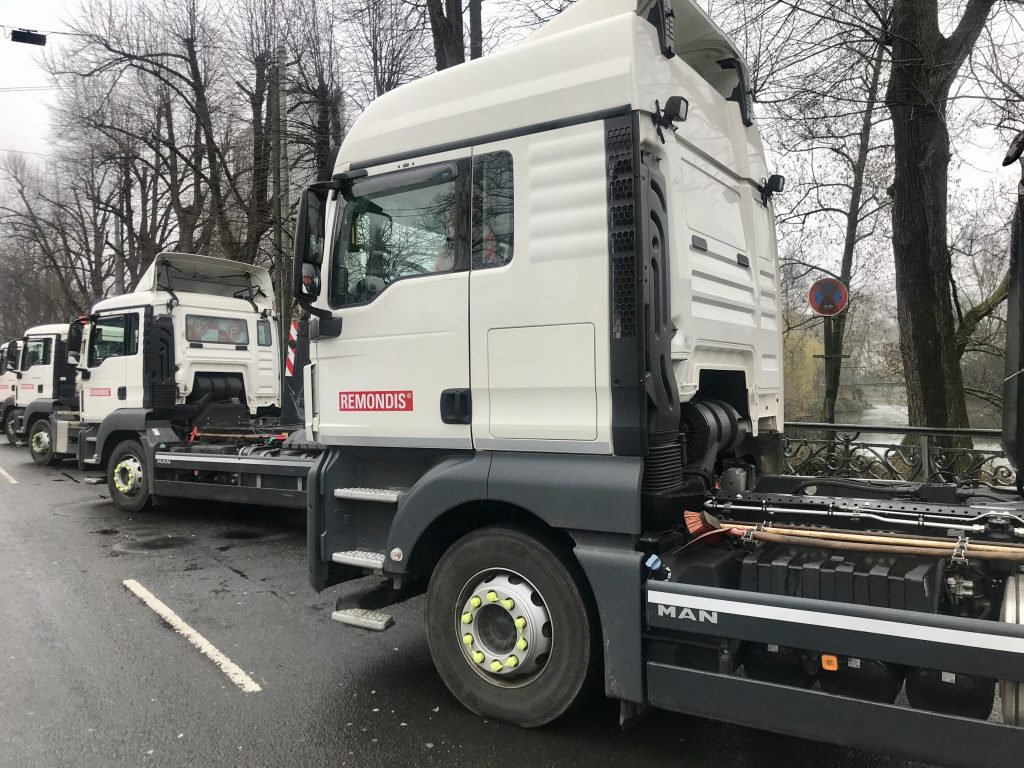
These conditions have now been considerably tightened.
Old (January):
- worldwide turnover of 250 million euros;
- There are indications that further acquisitions may restrict domestic competition.
New (September):
- worldwide turnover of 500 million euros;
- objective evidence that further acquisitions could significantly impede effective competition;
- the share of the company concerned in the supply or demand in the relevant sectors of the economy is 15% or higher;
- prior to this, a sector enquiry is carried out.
The difference between January and September is like the difference between big party for the Bundeskartellamt and keeping a distance of two metres to everyone. A prior sector enquiry? Then we will wait for three years until case 1 is ever undertaken. Or does it suffice that there was an inquiry in 2012 of a certain recycling system to go after the case in point, namely Remondis? [Added later: The Bundeskartellamt currently is doing a sector inquiry on waste, see comment below. RP] The other exemplary case, Flixbus/Postbus on distance bus services, which the Cartel Office was also unable to examine to its chagrin, would probably already have failed due to the turnover threshold, not to mention a previous sector enquiry.
I look forward to the new way in which the share in the relevant sectors will be determined. This is the breakthrough (and I don’t even know if I am being ironic or not): Bye-bye market definition! Let’s have the first section 39a case [– if there ever will be one].
Merger control (but now for real)
Margrethe Vestager, whose Directorate-General for Competition is not currently at a loss for reform proposals, has also come up with something new for merger control. The Commission suffers from the fact that it cannot get at some cases. This could probably be remedied with a transaction volume threshold which would bring one or two GAFA mergers into focus.
Problem: This would require an amendment of the Merger Control Regulation. Follow-up problem: If you start legislating there, someone may come up with the idea of putting something into this regulation that really does not belong there, e.g. a kind of ministerial authorisation for European Champions (horribile dictu).
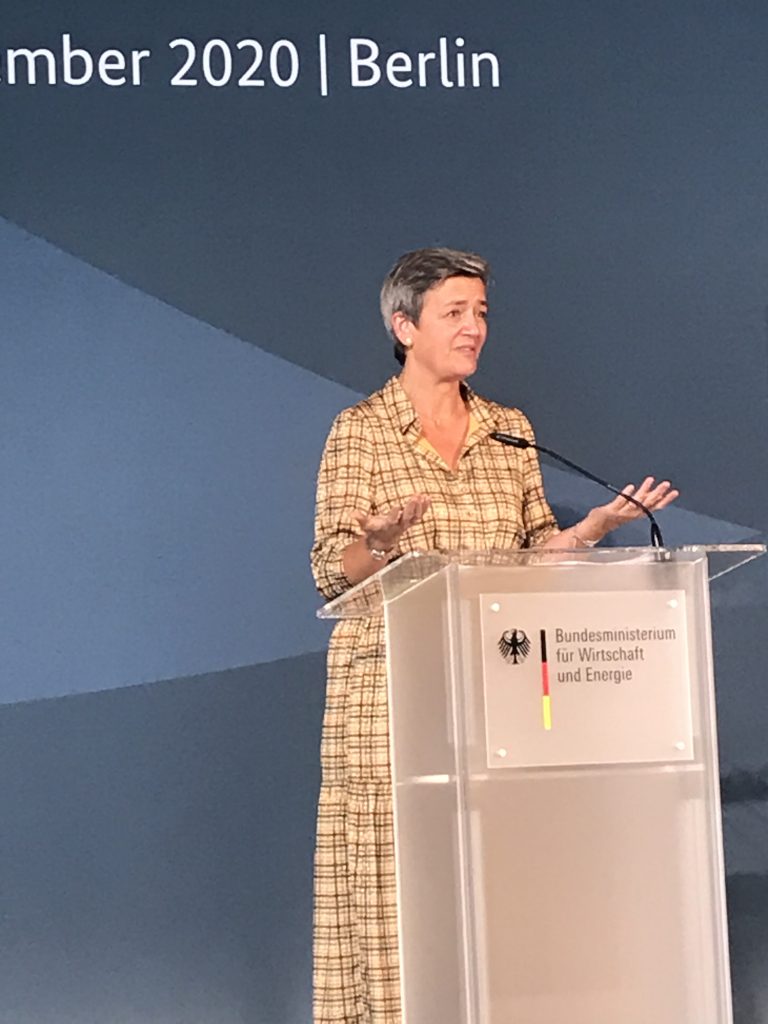
Way out: Vestager took another look into the Regulation and got stuck with Article 22. As you will surely remember, this is about the referral from the Member States to the Commission, so that in the context of “fine-tuning” the allocation of cases, cases which do not reach the thresholds of Art. 1 ECMR but are better examined centrally can be referred to Brussels. So far, so reasonable.
The highlight of this provision is in the second sentence of para 1: The case does not need to be notifiable in the member state. Whutt?! Exactly. Member States can send cases to the Commission which are not notifiable either at EU or national level. The background to this so-called “Dutch clause” is that when the Merger Control regime was introduced in 2004, there were still countries which did not have their own merger control rules and were therefore virtually dependent on administrative assistance from Brussels. This is now only the case with Luxembourg. Even Markus Wagemann, a member of the Bundeskartellamt, who comments on the provision in a German handbook on competition law, states:
“The inclusion of cases which are below existing national intervention thresholds is not convincing, since both the history of the rule and its purpose – a “fine-tuning” of the allocation of responsibilities between the Commission and the Member States in a system with basically fixed turnover thresholds (Art. 1 (2) and (3) ECMR) – speak against it.” (§ 17 recital 163)
Vestager will now take a different view, and she will get rid of the “small issue” (her diction) that the Commission has so far been reluctant to accept such referrals. By the middle of next year she expects guidance as to which cases the Commission would like to have submitted would accept on request.
Competition of competition conferences
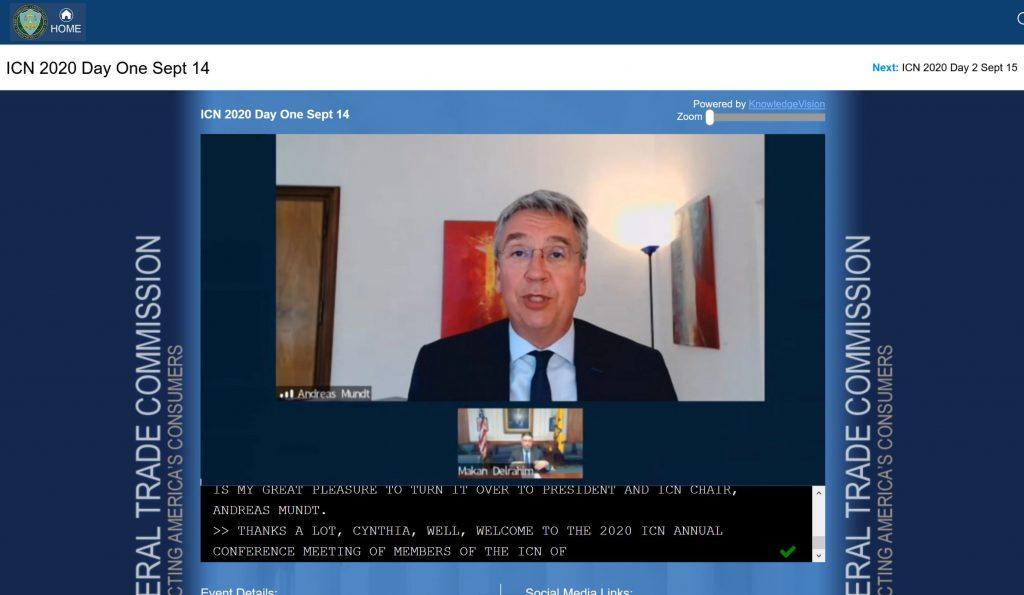
While writing this, I am listening with one ear to the ICN conference, which is being broadcast online as a global meeting of competition authorities. ICN stands for International Competition Network, a forum where Messieurs Mundt, Delrahim or Steenbergen meet. Here you will find the link to the virtual conference, which will be on show until Thursday, 17 September 2020.
And while I’m on the event notes: On Thursday morning, I will be talking to Peter Meier-Beck, the presiding judge of the BGH cartel senate, about Facebook, the FRAND ruling and other current affairs in a format called “WuW-Dialogue”. Online participation (a) does not cost any monetary fee and (b) you are allowed to ask questions, which I will then read out. You can find the link to registration here.
Should I also mention the European Data Summit of the Konrad-Adenauer-Stiftung in Berlin? There will be a “packed programme” where, for example, Oliver Bethell (Google) and Andreas Schwab (EU Parliament), Ben Schroeter (Booking) and Silke Hossenfelder (Federal Cartel Office) will meet. (I am also there, teaming up with Philip Marsden, so this is another case of self-preferencing). Unfortunately, the European Data Summit partly overlaps with the Professors’ Conference of the Bundeskartellamt. Sometimes this competition is exhausting.
European Competition Day
The European Data Summit should not be confused with the European Competition Day, which the Federal Ministry for Economic Affairs and Energy recently organised as part of the German EU Presidency (videos here, programme to lay aside and fast forward here). At #ECD2020 Peter Altmaier and Margrethe Vestager met, and yours truly was supposed to be a buffer between the two. Since the Siemens/Alstom story, Altmaier obviously does not have the image of being a champion of free competition in Brussels. The image did not improve as a result of the tense negotiations on Lufthansa slots conducted by State Secretary Ulrich Nussbaum and Director-General Olivier Guersent. In Berlin, the Minister responsible for competition kept his distance with the Commissioner responsible for competition, despite my attempts at rapprochement. But in Corona times it is hard to embrace each other. The distances in the seating group were even measured with a hard wooden stick, after we had dared to make the chairs a little more conciliatory on stage.
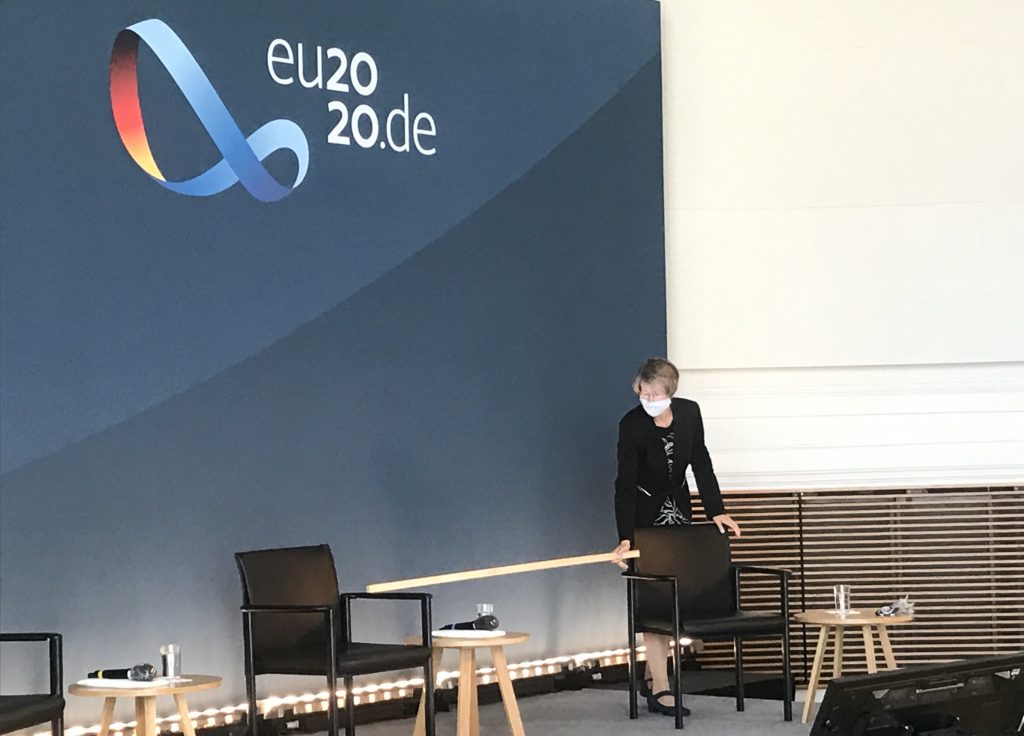
Another panel, no less prominent, dealt with the Commission’s anti-China tool, or more precisely with the White Paper proposing measures against companies from third parties that received state aid at home (ensuring a “level playing field”). The panel with Carles Esteva Mosso of DG COMP, Chief Policymaker Philipp Steinberg of the German Ministry, Michiel Boots, Chief Economist of the Dutch Ministry of Economic Affairs, and Alicia Garcia-Herrero, a Bruegel expert on Asia, all agreed that we must do something. However, the practicalities of such an instrument do not yet seem clear – who will examine, by what standards, with what sanctions?
The Commission’s suggestion in the White Paper works like a big family reunion after all these Siemens/Alstom hassle – all Europeans like to see the reins tightened for the representatives of Chinese state capitalism. Appropriately enough, sitting in the room on beautifully arranged chairs were, among others, the head of the Portuguese Autoridade da Concorrência, Margarida Matos Rosa, and her colleague from the Romanian Consiliul Concurenţei, Chiriţoiu Bogdan, to name but two. Whether this family will still hold together if China strikes back in return remains to be seen.
Platform Panel, Corona Panel, ceiling panel
The panel on platforms (Cambridge economist Diane Coyle, Facebook’s attorney Michael Esser, anti-big-tech lawyer Damien Geradin and Apple’s attorney Kristina Nordlander as moderator) was preceded by three remarkable speeches: Firstly, Bruno Le Mair, the French Minister for Economic Affairs, in hard, well-worded words conjured up the fight against the “gatekeepers” from Silicon Valley and unfortunately also the need for “industrial champions”. Although this only came via video, it was très énergique. Furthermore, Tim Milde and Jörg Hellwig, two “Chiefs” from the companies XOM and Lanxess, performed well. They presented their B2B trading platforms. I liked that very much. We need more presentations from the business community at our conferences!
A clear message: If these B2B marketplaces are to be successful, then antitrust checks must be speedy and legally certain (as Michael Esser translated it for us lawyers). One of the two digital managers said: “It would be great if we had a clear checklist that we simply can work through.” I am afraid that someone will have to tell them that law is somehow different…
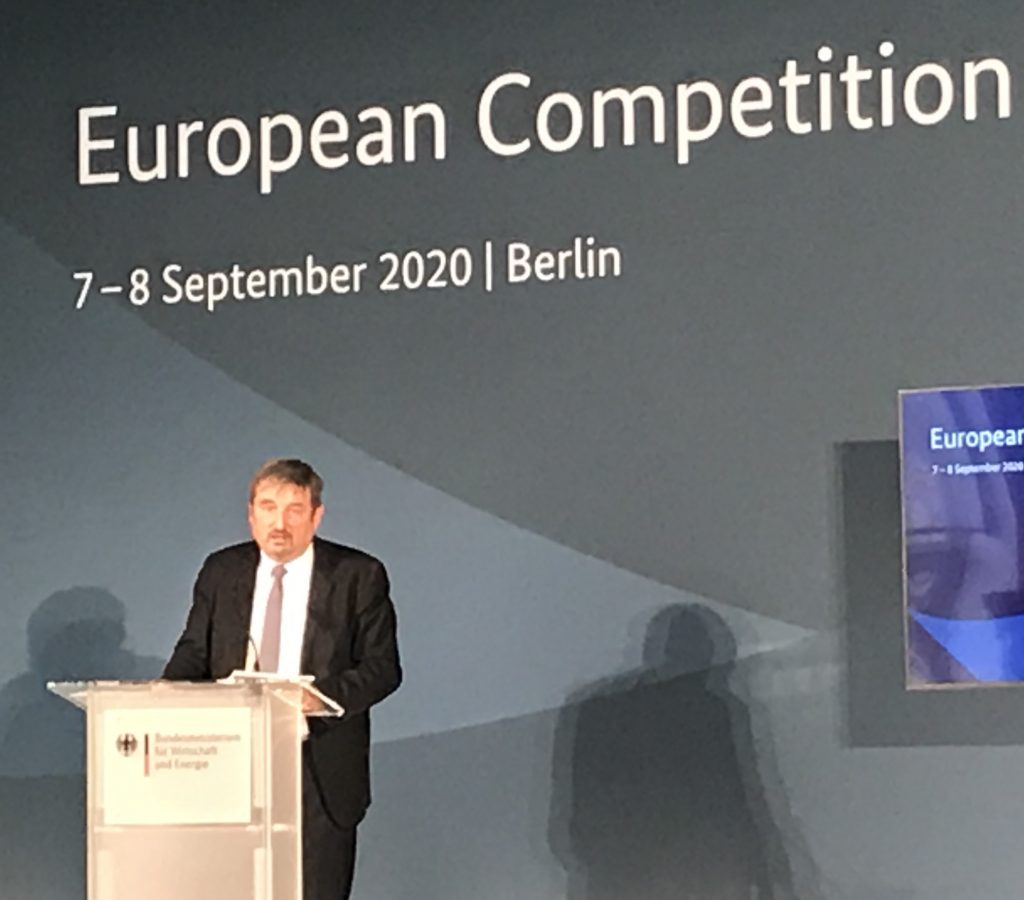
Olivier Guersent 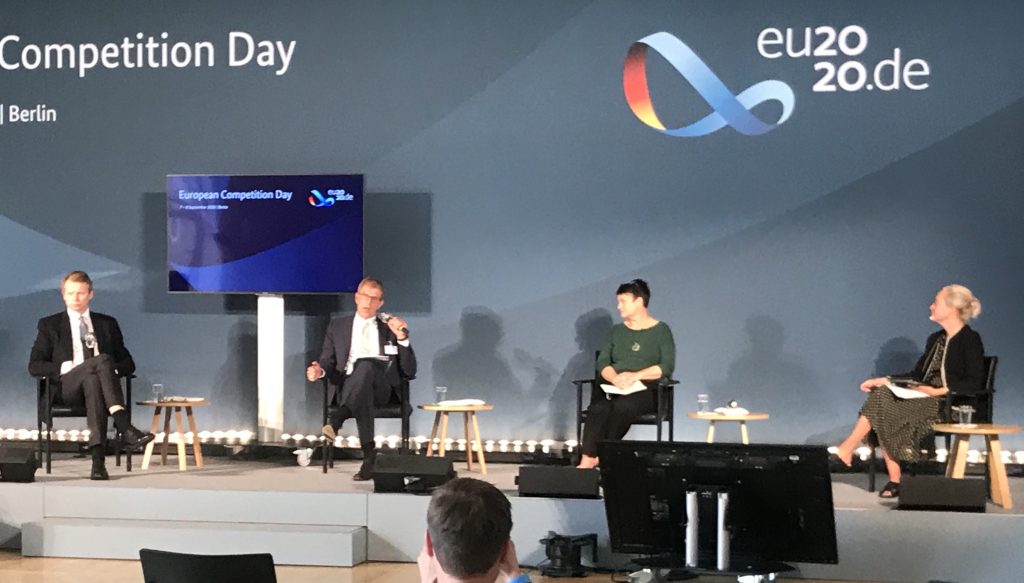
Platform-Panel 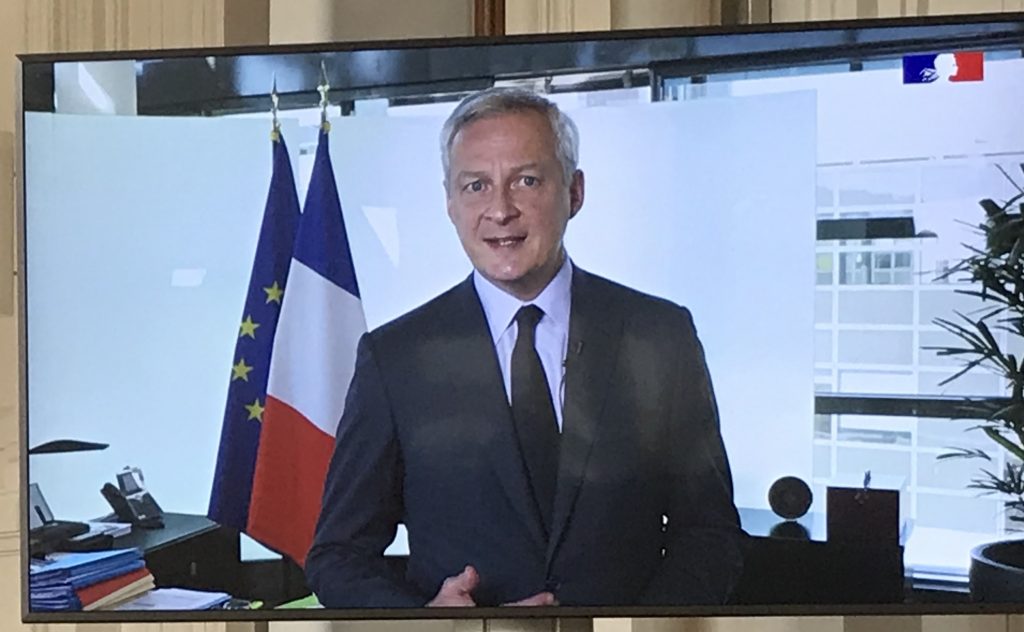
Bruno Le Mair via videoscreen 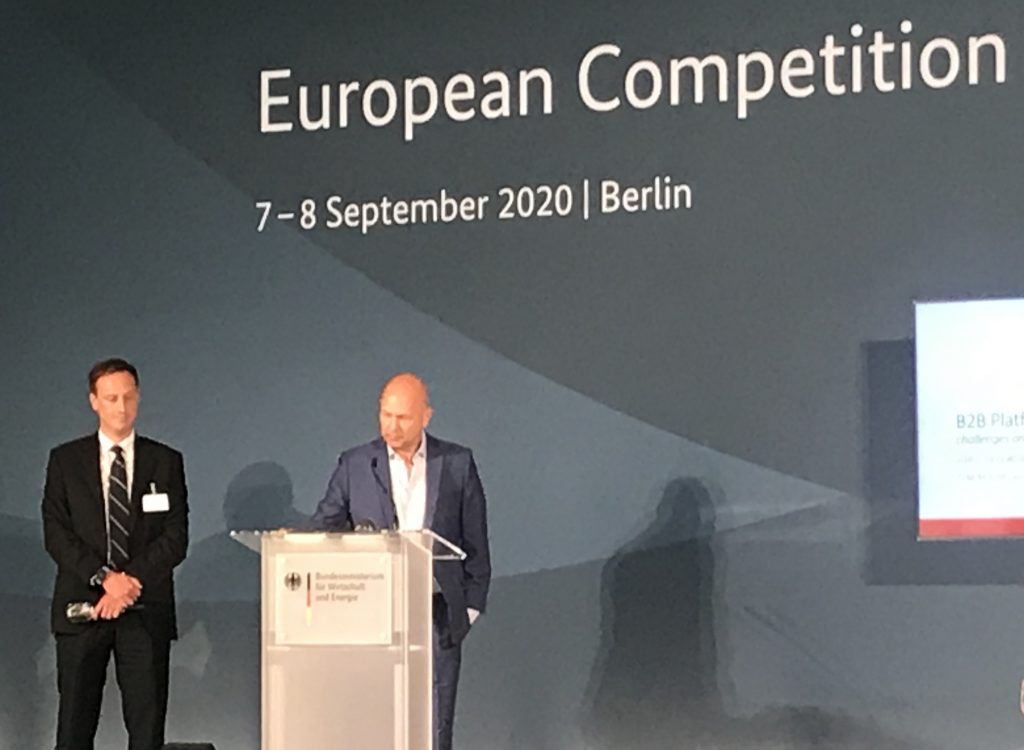
B2B-presentation by Tim Milde and Jörg Hellwig 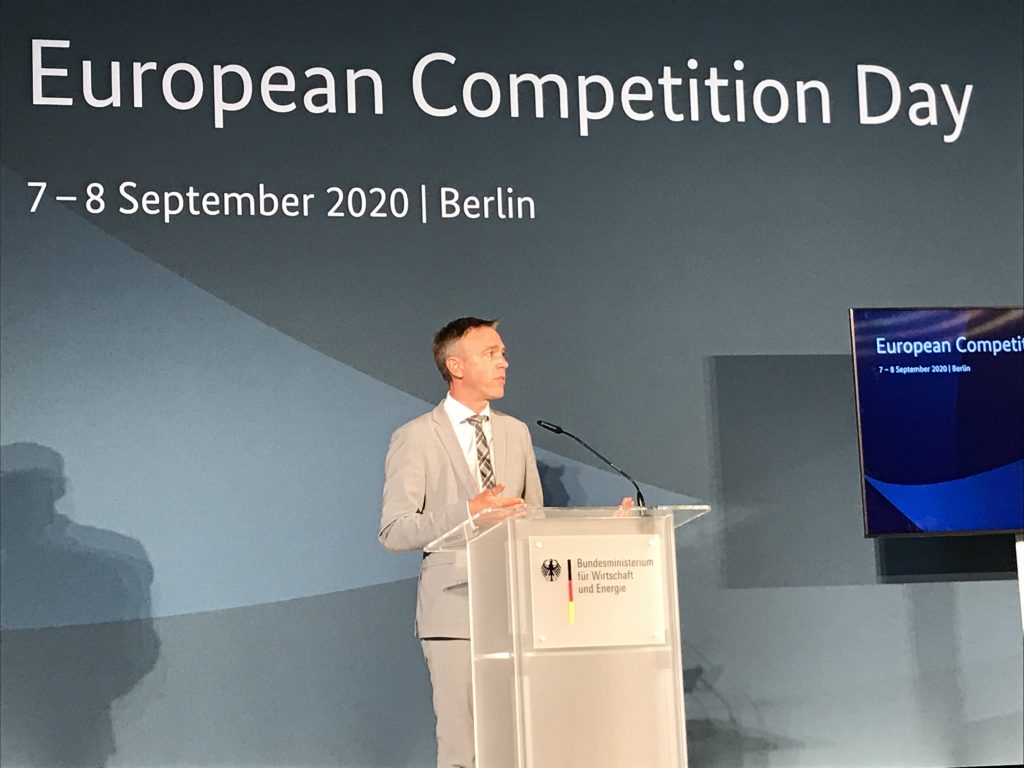
Philipp Steinberg 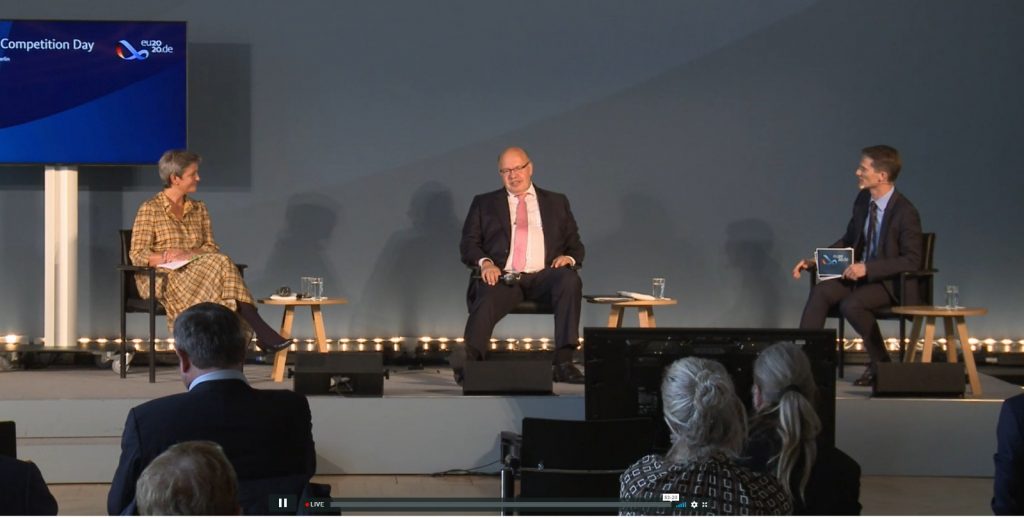
Summit Vestager/Altmaier 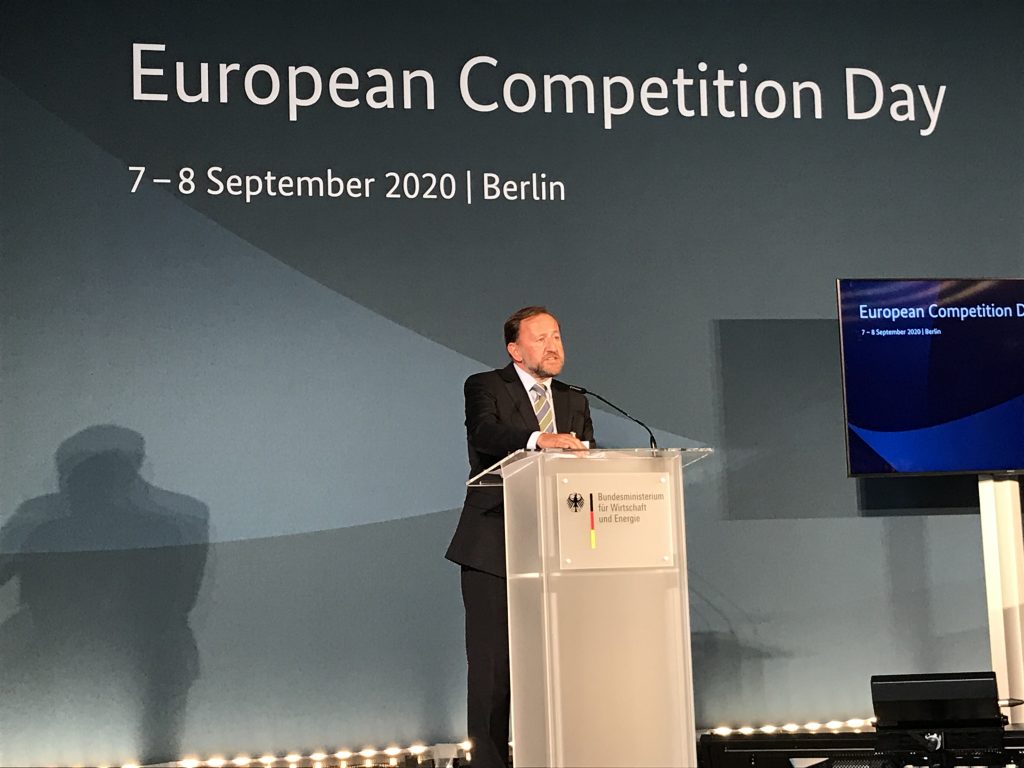
Carlos Esteva Mosso 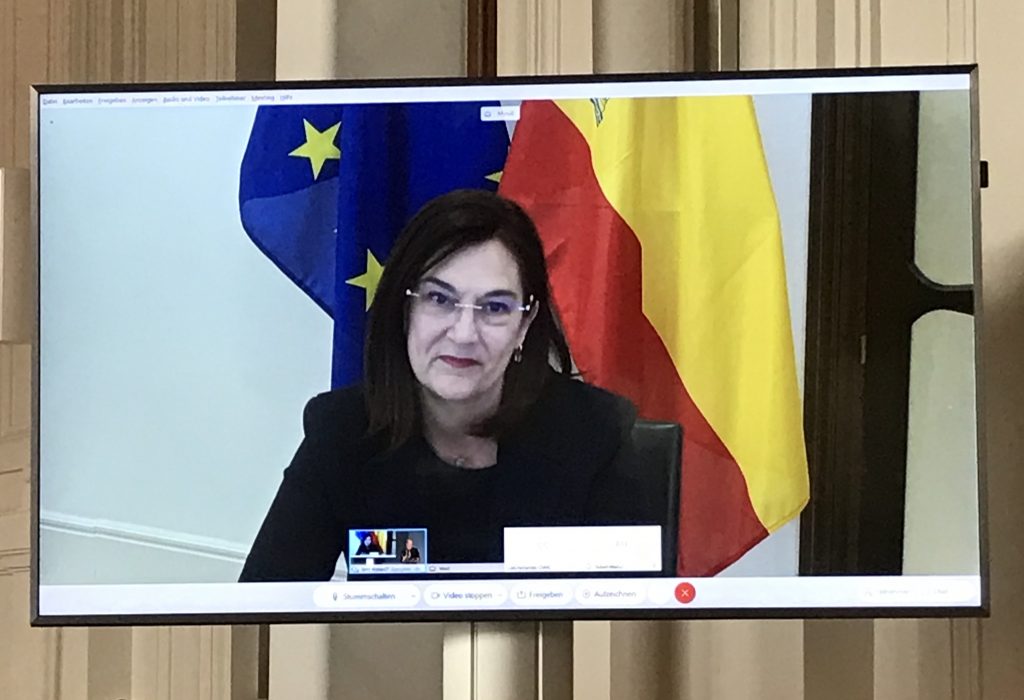
Cani Fernández 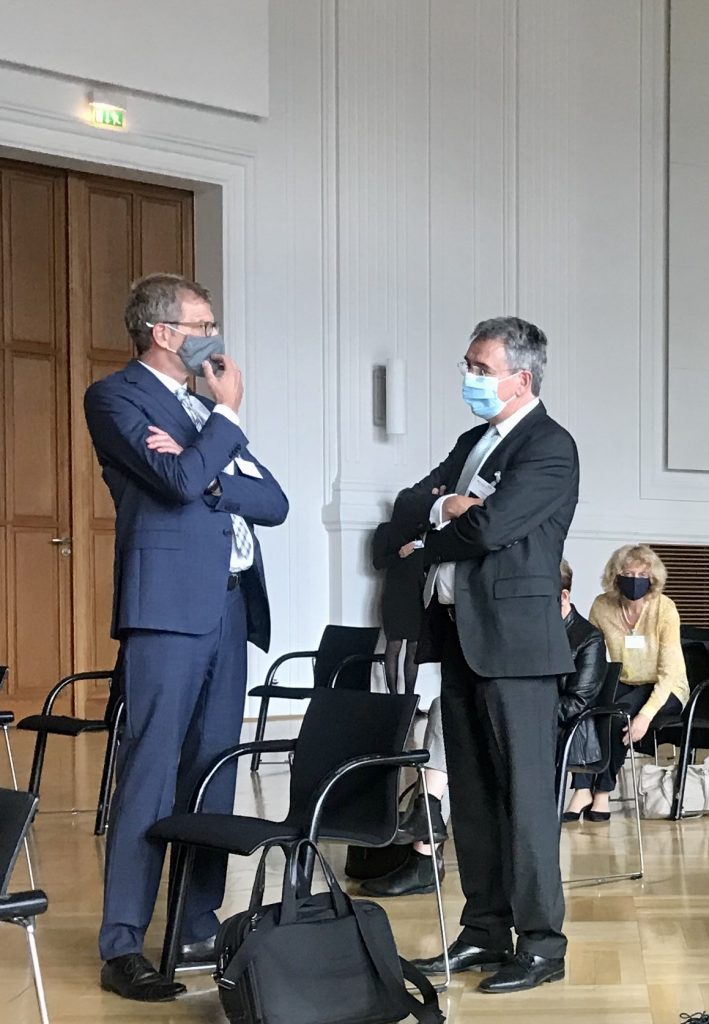
Michael Esser & Andreas Mundt chatting
From the panel, a sentence by Diane Coyle stuck with me. She said something along the lines that advertising is a business model that is not a good one. Michael Esser (and also me) had understood it this way, and Esser confronted Coyle with the fact that neutrality of antitrust law must be preserved. Coyle replied she did not mean it that way. The rest got lost on me, but it sounded really interesting. In any case, it was more music to my ears than that old tune that we once thought that AOL… Michael Esser put on this evergreen of the GAFA defence once again, but Damien Geradin’s look at that moment was mine too: it went to the ceiling.
There, I saw the logo of the German EU Presidency. It is a Möbius strip. I thought a lot about it, even when top enforcers Olivier Guersent (EU), Andreas Mundt (Germany) and Cani Fernández (Spain) spoke on “Competition and the fight against the pandemic” in the last panel. They committed to good but difficult work in the authorities, to a return to a market economy after state spending, to vigorous rather than more lenient enforcement, and to the return of dawn raids. Why had Germany given itself this Möbius logo? I prefer to leave such questions to the ingenious German design diary.
Personal data
The antitrust lawyer Daniel Zimmer had used the Möbius thing for his crime novel, which we discussed here once. In the same posting we had reviewed a book by Achim Wambach and Hans Christian Müller. Wambach now shares with Zimmer that both were chairmen of the Monopolies Commission. Wambach’s term of office as head of that advisory body to the German government on competition matters came to a regular end (this is distinct from Zimmer who resigned in protest against a ministerial authorisation for a food retail merger). Jürgen Kühling takes over from Wambach. Kühling is a law professor in Regensburg and is primarily concerned with regulatory law. He has already served as Wambach’s deputy. The latter will also stay in the Commission for a while. Wambach takes his farewell as an opportunity to look back on several stops on Twitter.
Enough for today. If you read this for too long you miss too much elsewhere… See you soon!
Rupprecht Podszun, the author of SSNIPpets, is one of the directors of the Institute for Competition Law at Heinrich Heine University in Düsseldorf and holds the Chair for Civil Law, German and European Competition Law. He has just published an expert opinion for the German institution “Deutscher Juristentag” on platform regulation.
5 thoughts on “SSNIPpets (40): European Competition Days”
Zu dem neuen § 39 a: Das Amt hat ja vor ziemlich genau zwei Jahren die Sektoruntersuchung Hausmüllentsorgung begonnen. Auch wenn nicht so richtig klar ist, wie lange es noch bis zum Abschluss dauert, ist die Notwendigkeit einer vorherigen Sektoruntersuchung vielleicht doch nicht so eine hohe Hürde….
Ah, super, danke für den Hinweis, das hatte ich nicht im Kopf! RP
Zum Degenhardt-Artikel in der FAZ: Leidlich gerechte Empörung, wobei es ja nicht unzulässig ist, sich auch mit einem bezahlten Gutachten inhaltlich auseinanderzusetzen.
Vielen Dank für die schöne Zusammenfassung der aktuellen Ereignisse!
Und vielen Dank auch, dass Sie hier Transparenz zum Artikel von Professor Degenhart schaffen. Laxer Umgang mit Transparenz scheint leider unter Rechtswissenschaftlern zuzunehmen. Im Cum-Ex-Komplex gab es offenbar reihenweise Fälle, in denen Professoren Auftragsartikel verfasst haben, ohne dies offenzulegen. Auch im Dieselgate-Komplex gab es wohl viele solcher Fälle. Und ich denke hier auch an den Aufsatz von Professor Rixen zur Impfpflicht nach dem Masernschutzgesetz (NJW 2020, 647). Dort hält Professor Rixen die Impfpflicht für verfassungsrechtlich bedenklich, aber es wird nirgends erwähnt, dass er Impfgegner vor dem Bundesverfassungsgericht in eben dieser Sache vertritt.
Insgesamt finde ich es recht bedenklich, Auftragsgutachten von Professoren zu veröffentlichen. Denn es wird dem betreffenden Professor schwer fallen, von dieser Auffassung in späteren Veröffentlichungen wieder Abstand zu nehmen, wenn ihn nicht mehr der Auftraggeber, sondern der Staat bezahlt — und Wissenschaftsfreiheit gewährt.